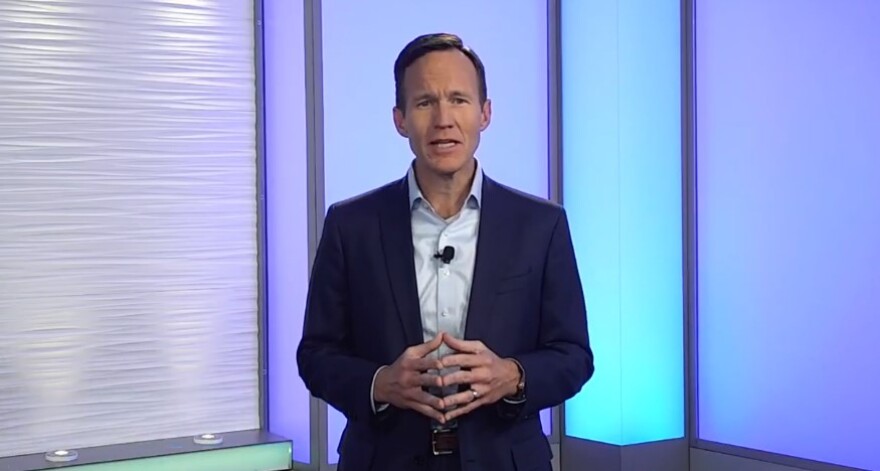Duke Energy told investors Tuesday it will boost spending on clean energy to $145 billion over the next 10 years, which it says will increase profits and meet a new goal for cutting the heat-trapping pollution that causes global warming. But Duke also says it will mean higher rates.

The plan is a $10 billion increase over what Duke previously announced. CEO Lynn Good said during an online video update that the plan will help Charlotte-based Duke meet a new goal of cutting carbon emissions by 80% from 2005 levels by 2040. The company is already about halfway to that goal, at 44%.
Eighty-five percent of the cost will go toward modernizing the electric grid and replacing coal-fired power plants with more natural gas-burning plants, as well as solar, wind and other clean energy technologies. The plan also pays for renewing nuclear plant licenses and calls for upgrading gas-fired plants to one day burn hydrogen.
Chief financial officer Brian Savoy assured investors that all that spending won't hurt profits but instead will fuel a roughly 7% annual increase in profits over the next 10 years.
"Ninety percent of our electric capital investments are eligible for modern recovery mechanisms," Savoy said.

In other words, Duke expects to recoup those costs through higher customer rates. Savoy gave no details on potential rate hikes. But in North Carolina, the company has said previously that its carbon plan could mean annual increases of 1.9% to 2.7% for a decade, subject to regulatory approval.
Good said Duke is plotting a gradual transition that won't disrupt service and suggested that Duke would help low-income customers with rate hikes.
"We will never put a plan together that does not achieve the reliability 24/7 every season that our customers count on. And affordability is front and center, not only for our industrial customers who are competing globally with their products but for our vulnerable customers who are having to make tough choices about their income," Good said.
Taking steps on climate and costs
Investors and customers are watching how Duke, one of the nation's largest electric utilities, is addressing climate change.

On Tuesday, Duke strategic planning executive Swati Daji announced the new 2040 emissions goal, saying it has made good progress.
"This new goal is building on our confidence that we will exceed our 2030 target of 50%. By 2035, we plan to retire all our coal plants, subject to regulatory approvals, and have 30,000 megawatts of renewables connected to the system," Daji said.
That means renewables such as solar and wind power will equal the output of a dozen large coal-fired power plants.
Even as Duke touts its progress on climate goals, the Sierra Club is questioning it. The environmental group issued a report Monday that gave Duke's climate efforts a "failing" grade. The report criticizes Duke and other companies for being slow to retire coal plants and for adding more gas plants.
Dave Rogers, of the Sierra Club's Beyond Coal campaign, said when it comes to retiring coal plants, "We need to really look into replacing that with zero carbon emitting resources like wind and solar power, rather than just switching to gas which is going to lead us to switch again."
Also Tuesday, Savoy described a $200 million cost-cutting campaign beginning by year's end.
"In response to inflationary pressures and rapidly rising interest rates, we launched an enterprise wide effort to reduce costs. This $200 million initiative builds on our years of cost management," Savoy said. "We are truly rethinking how we work. We are finalizing the opportunities, and we will begin implementing this quarter."
Savoy did not mention layoffs or any other details.
Quick hurricane recovery
Meanwhile, Good started the meeting by acknowledging the devastation of Hurricane Ian across Florida and the Carolinas last week. She said Duke was able to restore power to nearly 2 million customers quickly.
"We were prepared," she said. "And I'm very proud of the work that we did to restore customers in Florida. Ninety-seven percent of our customers were restored within three days, which was Sunday night. And in the Carolinas, the storm was lesser but still almost a million outages. And we restored those customers, 99% of them, in two days, which was also Sunday night."
And Harry Sideris, Duke's executive vice president of customer experience, solutions and services, said recent upgrades to the transmission system have paid off.
"I can see that it's working. Not only do we have significantly fewer customer outages with Hurricane Ian, but we were able to restore service in less than half the time to our customers," he said.







